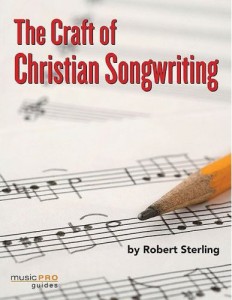(Guest post by the inimitable Robert Sterling. Find out more about Robert here.)
 The single most common Poetic Device used in songwriting is without a doubt – rhyme. Unfortunately rhyme is seemingly so simple, the beginner songwriter may assume it to be easy. (Simple is very different than easy.) Really great rhyme is a well-practiced craft.
The single most common Poetic Device used in songwriting is without a doubt – rhyme. Unfortunately rhyme is seemingly so simple, the beginner songwriter may assume it to be easy. (Simple is very different than easy.) Really great rhyme is a well-practiced craft.
For those of you songwriters that haven’t read my book (Shame on you, by the way.)here are some quick tips that might help you better master a part of the craft we all too often take for granted.
Rhyme the important stuff. Rhyme draws attention to itself, so try to land your rhymes on words that reinforce the song’s message or atmosphere. If you rhyme unimportant words, you’re telling the listener you’ve written an unimportant song.
Save the stronger, more creative rhyme line for the second half of the rhyme. Make your listeners wait for that great rhyming line.
Avoid predictable rhymes. Predictable rhymes telegraph to the listener what’s coming, spoiling the surprise. Because double and triple rhymes have fewer obvious rhyme choices, they have a greater tendency to create predictability than do single rhymes. This is a tough thing to do, but it’s worth the effort.
Vary the color of rhymes within a song. Using only one kind of rhyme is boring. Mix up the use of single, double, and triple rhymes. Try slipping an internal rhyme in occasionally. Avoid the overuse of the same rhyme vowel.
Rhyme naturally. A classic problem of novice writers is inverting words in a phrase to force a rhyme. I call this “Yoda speak.” Better to write the words the way people actually speak, and look for a new rhyme.
When you’re stuck for a rhyme, try rephrasing the line. Sometimes you can say the same thing another way and open up new rhyming possibilities. For example, the line “Love always ends that way” can be rephrased to “That’s how love always ends,” and suddenly you have a new rhyming word without changing the meaning or the message of the lyrics.
Don’t settle for sloppy rhyme. Even imperfect rhymes shouldn’t be weak. Rather than settle, dig a little deeper. You may find something terrific.
Get a good rhyming dictionary. Not even the most brilliant wordsmith can think of every possible rhyme for a line. A rhyming dictionary, whether an actual book or in software form, is a great tool for finding an elusive rhyme or for jump-starting the rhyming process.
Every now and then, don’t use rhyme. Sometimes little or no rhyme can be very effective if it is done purposefully and with solid craftsmanship. Michael McDonald and Kenny Loggins used almost no rhyme at all in their song “What a Fool Believes.” But the lack of rhyme suits the unusual musical phrasing of the song.
That’s it for today. Now go read my book.
(Excepted and edited from The Craft of Christian Songwriting by me, the author.)

1 comment:
Wow mind blowing post, thanks for sharing. Many of the songs that are associated with religions are very memorable and help people to get across their feelings and emotions when it comes to their faith. This simple way of showing faith has encouraged a great number of people to learn to play guitar as this allows them another outlet to show their faith and devotion.best one thing remains chords
Post a Comment